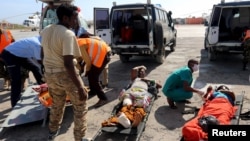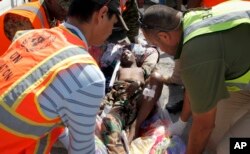Somali authorities arrested six people in connection with Sunday's double bomb attack by al-Shabab in the town of Baidoa that killed at least 32 people and wounded more than 60 others.
“We have arrested six people suspected to be the organizers and the masterminds of the explosion, and they will be brought before justice," said Abdullahi Ali Watiin, the district commissioner of Baidoa.
Police and the local government said the center of the town, located 245 kilometers west of Mogadishu, was very busy when a car bomb exploded near the main market.
A second blast, believed to be from a suicide bomber, went off moments later at a restaurant.
Meanwhile, Somali Cabinet ministers held an extraordinary security meeting late Sunday in Mogadishu to discuss recent al-Shabab attacks.
Security Minister Abdirisaq Omar Mohamed spoke to VOA Somali about the effort to defeat the militant group.
“We know, only military force cannot defeat al-Shabab. We need to launch an ideological war against them so that we can at least convince the young Somalis they brainwashed to refrain from the violence, and of course political solution for those who want to take the peaceful way is a vital," Mohamed said.
Al-Shabab had time to plan
Former Somali Intelligence Chief Ahmed Fiqi said the Islamist militant group was given a chance to plan and carry out their attacks because no major military operation against the group's hideouts has been launched in the past two years.
“The last two years, no major attack to pursue the militants were taken," Fiqi told VOA. "So that gave them a chance to think and plan their attacks accordingly, whether it is guerilla and hit-and-run attacks on the AU bases or suicide attacks on civilian targets.”
He said the African Union peacekeeping mission in Somalia lacks central command and pursues different agendas.
"To my knowledge, the troops involving into the mission take the final orders from their individual countries, not a central command run by the mission commanders. We also know that each troop-contributing country focuses on [its] interests rather than the return of peace in Somalia. So, how can they succeed their mission?" he asked.
Consecutive attacks
Sunday's attacks in Baidoa came two days after two massive explosions killed 25 people and wounded nearly 60 others in Mogadishu. Al-Shabab claimed responsibility for those bombings as well.
The militant group, which has links to al-Qaida, carries out frequent attacks in Somalia, often targeting government officials and African Union troops.
Al-Shabab controlled most of southern Somalia as recently as 2010, but has been pushed into the countryside by AU and Somali government forces.






